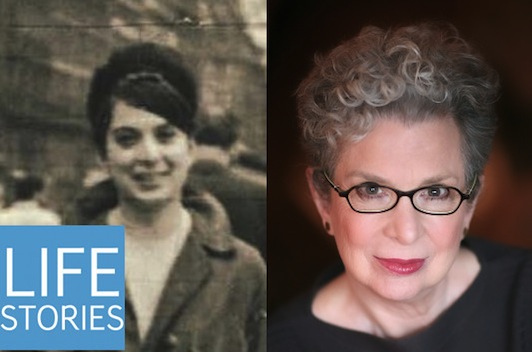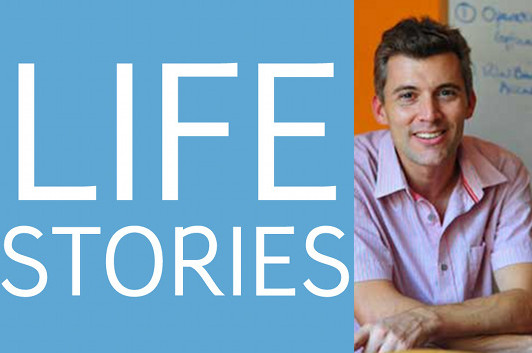Life Stories #55: Nancy K. Miller
Subscribe to Life Stories in iTunes

photos: courtesy Nancy K. Miller
Life Stories is a podcast series where I talk to memoir writers about their lives and the art of writing memoir. This week’s guest, Nancy K. Miller, teaches classes on memoir as a professor of English and comparative literature at CUNY, so one of the things I made sure to ask her was whether that made it any easier to tackle her own life writing, as seen in Breathless: An American Girl in Paris. “Not really,” she told me, but she also mentioned that her awareness of what literary theorists call “the autobiographical pact” strengthened her own resolve to be truthful in telling her story, even when adding stylistic embellishments.
Mostly, though, we talked about the story she tells of a young woman in the 1960s, fresh out of college, inspired by Jean Seberg in Godard’s Breathless to go to Paris where she attempted to become, as she puts it, someone other than her parents’ daughter—only to find that the more she tries to break that orbit, the tighter she gets locked into it. That eventually led her into a marriage which, I observed, she eventually set about undermining with a fascinating precision through an extramarital affair. Her response was intriguing:
“I know this might seem impossible, but… I had never been in therapy, I didn’t know anyone in therapy, I’d almost say I didn’t know I had an unconscious–and the concept of self-sabotage was not available to me. What I think happened was, because I really was not on to myself, I just kept going along with a certain amount of unhappiness and frustration with no language for it, and I also had no vision, because I was so invested in the idea that I was going to remain in Paris and remain in this situation that I couldn’t see a way out. I didn’t even know I would approach the idea of there being a problem, say, in my marriage because my ex was not someone you could even talk to… talk with about these things, because he didn’t have an unconscious either, as far as I could tell.”
We also talk about how she initially rejected the advice from the therapist she shared this story with as it was happening, and how the blossoming of the feminist movement in the late 1960s and 1970s ultimately helped her turn her life around once she stopped worrying about who she was supposed to be and began to contemplate what she could do. Longtime listeners might recall an earlier interview with Jessica Dorfman Jones about the slow destruction of her own marriage and the early glimpses of her life afterwards, which makes for an interesting juxtaposition here, I think—so if you haven’t heard that episode before, I’d encourage to seek it out.
Listen to Life Stories #55: Nancy K. Miller (MP3 file); or download this file by right-clicking (Mac users, option-click). Or subscribe to Life Stories in iTunes, where you can catch up with earlier episodes and be alerted whenever a new one is released. (And if you are an iTunes subscriber, please consider rating and reviewing the podcast!)
1 December 2013 | life stories |
Life Stories #54: Josh Ruxin
Subscribe to Life Stories in iTunes
Life Stories is a podcast series where I talk to memoir writers about their lives and the art of writing memoir. In this episode, you’ll meet Josh Ruxin, an international aid worker who moved to Rwanda eight years ago to set up a community-based program that would be a model for that nation’s economic recovery. The project was supposed to last two years, but he and his wife are still there—in fact, they’ve opened a restaurant that’s become one of the main attractions of the capital city of Kigali. In A Thousand Hills to Heaven, Ruxin tells the story of what drew him to Rwanda. In our conversation, we discussed his motivations for writing a memoir, which include setting down what he’s learned about creating economic aid programs that can lead to true self-sufficiency:
“On one hand, there are those who believe that if we just do more aid, more big aid, it’s going to solve everything in spite of evidence that most big aid actually hasn’t had much impact over the years. Then on the other side, you’ve got people who say all aid is bad and we just shouldn’t be doing it. And I came to realize, working with the government of Rwanda and of course working in the restaurant, that there is this middle ground–that, actually, there’s a lot we could be doing with aid that could be wildly effective and sustainable, and there’s a lot of lessons that can be learned from the private sector that should be applied through aid programs in order to make both public programs [and] the private sector thrive.”
We also talk about, among other things, the ways that contemporary Rwanda bears the memories of the brutal 1994 genocides—and the effort it’s making to become a different, better nation—and how his wife’s original idea for opening a coffee shop became a much bigger operation that either of them had anticipated. For those of you who’ve been listening to Life Stories for a while, if you enjoyed the interview with international relief worker Jessica Alexander, you’ll also appreciate Ruxin’s perspective on relief efforts in Africa—and, I later found out, the two of them actually come from the same town in Connecticut, and although they didn’t cross paths back then due to age differences, their fathers, both doctors, do know each other. Small world!
Listen to Life Stories #54: Josh Ruxin (MP3 file); or download this file by right-clicking (Mac users, option-click). Or subscribe to Life Stories in iTunes, where you can catch up with earlier episodes and be alerted whenever a new one is released. (And if you are an iTunes subscriber, please consider rating and reviewing the podcast!)
25 November 2013 | life stories |


 Our Endless and Proper Work is my new book with Belt Publishing about starting (and sticking to) a productive writing practice.
Our Endless and Proper Work is my new book with Belt Publishing about starting (and sticking to) a productive writing practice. 
